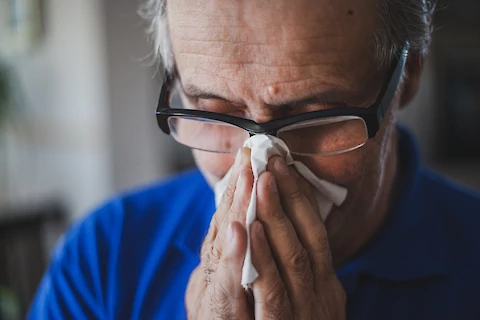
One challenge caregivers face when caring for their senior loved ones is seasonal allergies. Typically caused by pollen and dust, seasonal allergies inflict notable discomfort, especially eye irritations. This blog post provides targeted information and practical guidance to support caregivers in aiding their senior family members through this recurrent issue. We also discuss the common triggers of seasonal allergies and eye irritations symptoms and provide advice on managing and treating these uncomfortable symptoms. We aim to make allergy season more manageable for our senior community and their caregivers.
Understanding Seasonal Allergies
Seasonal allergies, also known ashay fever, occur when the immune system reacts to airborne substances like pollen. This category of allergens is particularly prevalent in certain seasons, thus the term "seasonal allergies." Seniors are by no means immune from these reactions. They may suffer from exacerbated symptoms due to pre-existing health conditions, making it all the more crucial to understand the triggers and learn to manage them effectively.
Symptoms of Seasonal Allergies
Seasonal allergies manifest various symptoms, from sneezing, runny nose, and throat irritation to fatigue. However, one of the most troublesome symptoms often involves eye irritations, leading to redness, itching, and watering. These symptoms may severely impact the daily life of seniors, making routine activities uncomfortable and challenging.
Treatment Options for Seasonal Allergies
There are a variety of treatment options for seasonal allergies. Over-the-counter antihistamines often serve as the first line of defense, helping to alleviate symptoms like itching and redness in the eyes. Prescription medications like eye drops or nasal sprays may also help, especially those with more severe symptoms.
Aside from medications, incorporating lifestyle changes such as staying indoors during peak pollen times and wearing sunglasses to protect the eyes helps to reduce the exposure and consequent discomfort. Eating a nutritious diet and getting adequate sleep and exercise will also help to control allergy symptoms. You may want to try herbal teas formulated to fight allergies. Adding some honey will give your tea additional flavor and health benefits.
Preventive Measures for Caregivers
As a caregiver, there are several measures to take at home to help protect your senior loved one from allergenic triggers. Replacing air filters regularly and maintaining a dust-free environment reduces allergens' presence. Many find relief from using a room-size air purifier, especially in the bedroom.
Additionally, monitoring local pollen levels and planning outdoor activities according to the forecast may also help minimize exposure. Understanding that managing discomfort involves treating symptoms and taking precautionary steps to prevent the onset is essential.
Senior Helpers Vero Beach Can Help
The seasonal struggle with allergies may represent quite a challenge for seniors, but informed care makes a significant difference. Caregivers play a crucial role in establishing a comfortable environment and ensuring proper treatment. At Senior Helpers Vero Beach, we're always here to lend a helping hand. For individuals residing in Fellsmere, Sebastian, Vero Beach, Fort Pierce, and Okeechobee seeking support for their senior loved ones, please don't hesitate to contact us today. We're committed to making allergy season more manageable. We'd also love to discuss our many services with you, like Wellness Watch and Respite Care.